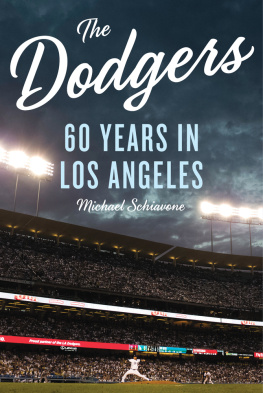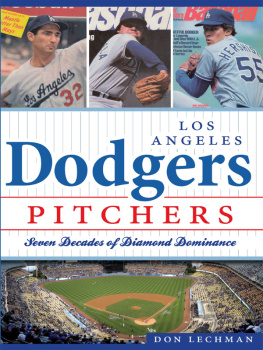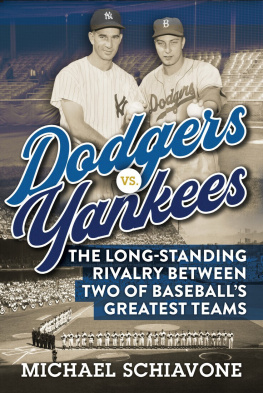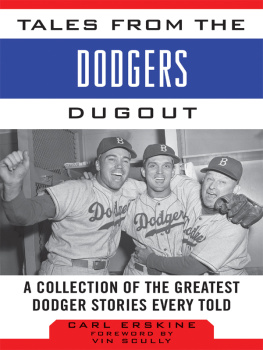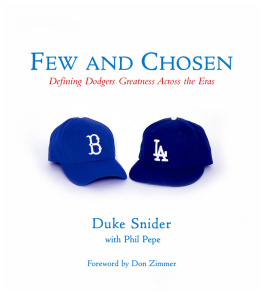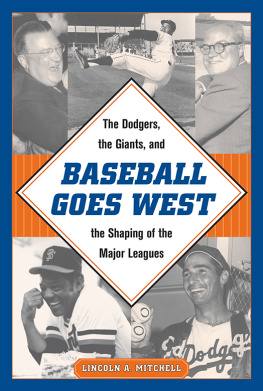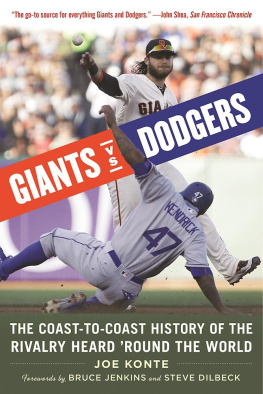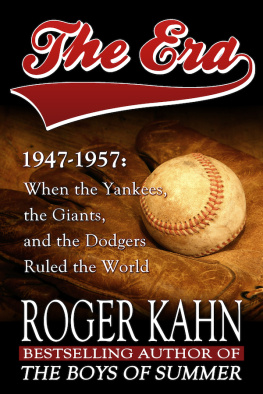
The 50 Greatest Dodgers Game of All Time 2015 by J. P. Hoornstra
Dodgers logo used with permission from the Dodgers and the MLB
All Rights Reserved. No part of this book may be reproduced or transmitted in any form or by any means, electronic or mechanical, including photocopying, without permission in writing from the publisher.
For more information contact:
Riverdale Avenue Books
5676 Riverdale Avenue
Riverdale, NY 10471.
www.riverdaleavebooks.com
Formatting by www.formatting4U.com
Cover by Scott Carpenter
Digital ISBN 9781626011946
Print ISBN 9781626011953
First Edition June 2015

The 50 Greatest Dodgers Games
Introduction
Picking the 50 greatest games in Dodgers history is a little like carving a turkey. You have a rough idea what it will look like when youre done. The hard part is figuring out where to begin.
To keep things slightly more simple, I limited the scope of this book to the Dodgers time in the National League. Back when they were known as the Brooklyn Bridegrooms in November 1889, president Charles Byrne withdrew the franchise from the American Association. Along with the Cincinnati Reds, Brooklyn joined the National Leaguebaseballs senior circuit at the ripe old age of 14for the 1890 season. Through four nicknames (Bridegrooms, Robins, Superbas, Dodgers) and two cities, the franchise has remained in the National League ever since. Pick up any Dodgers media guide and the first records are listed in 1890. Its a round number and a good place to begin.
National League baseball in 1890 would be a mostly familiar game to modern fans. In 1889, sacrifice bunts were first recognized in statistic-keeping. As you will see, the history of the bunt and the history of the Dodgers are intertwined. (A Brooklynite, Dickey Pearce, is credited with inventing the bunt.) Other important baseball rules were only a few years away. Substitutions were permitted at any point in a game beginning in 1891, the pitching distance increased from 50 feet to 60 feet, six inches in 1893, and bats were required to be round and made of wood that same year. The organizational ancestors of the present-day Giants, Braves, Pirates, Phillies, Reds and Cubs all played the Dodgers that year. So did the Cleveland Spiders, who ceased existence after the 1899 season (rest their souls).
So we start in 1890. That narrows the range of games to 125 seasons, which is still a vast ocean of baseball. Don Newcombe, whos been alive for most of that time, suggested a game he pitched for the Dodgers in 1949. Steve Garvey suggested a game he played in 1980. I received suggestions from just about everyone who was asked for help.
When choosing the 50 greatest games from more than ten thousand candidates, there are as many opinions as there are games. That comes with the territory of a franchise whose history spans two millennia, three centuries and 14 decades. Cultural barriers have been shattered (see game #2). Physical limits have been tested (see game #9, #24 and #36). Innumerable baseball records have been broken (seewell, just wait and see).
Some games are greater from a historical perspective than a baseball perspective. Some games are great because theyre strange. Some were exhibition games. Many were played in September or October. Others were more memorable for an outstanding individual performance. Not all of these games ended in Dodger victory, but victory isnt the only path to greatness. Do you remember the final score in Jackie Robinsons first major league game?
Not everyones suggestion made it in. That includes Newcombe. His choice: Game one of the 1949 World Series, which the Yankees won 1-0 on a home run in the bottom of the ninth inning. It was Newcombes rookie year and his first postseason start. He and Allie Reynolds threw dual complete games. Newcombe struck out 11 batters, walked none and allowed five hits, yet he lost.
You might not agree with my selections, or the order in which theyre ranked. Thats OK. Youre in good company.
50. October 5, 2001 :
72 home runs and no place to go.
Three games remained in the 2001 season when the Dodgers played a cruel trick on the San Francisco Giants. In a nationally televised game that garnered wide attention, the Dodgers took a 5-0 lead in the first inning, allowed the Giants to come back and tie the game at 10, only to win 11-10 on a run in the 7th inning. The Dodgers didnt need to winthey were solidly entrenched in third place, out of the playoff picturebut the Giants did. The loss eliminated them from the playoffs before a sold-out crowd at San Franciscos Pacific Bell Park. Everybody's goal is to make the playoffs, Dodgers first baseman Eric Karros told the media, but if you can't go, you want to take somebody else home with you.
Mission accomplished.
It was another counterpunch in one of sports great rivalries, one littered with late-season heartbreakers. The Giants had crushed the Dodgers playoff hopes by sweeping a two-game series in September 1997. In 1993, the Dodgers denied the Giants a possible playoff berth by beating them on the final day of the regular season. In 1991, the Dodgers finished two games out of first place after losing twice in San Francisco during the seasons final weekend. Go back a few more decades, and you could fill a whole book with great Giants-Dodgers games.
For Dodger fans, the final weekend of the 2001 season was especially sweet. The Giants lineup featured baseballs best hitter in Barry Bonds. In spite of thisand maybe because of the payroll constraints Bonds massive salary createdthe Giants could not win a championship with him. On this day, Bonds greatness and the Giants failure to reach the playoffs were front and center. The Dodgers were happy to play the spoilers. They did so in dramatic fashion and set a record in the process: At four hours and 27 minutes, it was the longest nine-inning game ever played in the major leagues. And yet, few people remember the game for this reason.
Bonds awoke Friday with 70 home runs for the season, tied with Mark McGwire for the all-time record. Since he was averaging one home run every 6.5 at-bats (also a record), Bonds was very likely to hit his seventy-first home run sometime during the weekend. This mainly depended on whether or not Dodgers starter Chan Ho Parkor any Dodgers pitcher, for that matterwould give Bonds a pitch to hit. Maybe Bonds would never see a pitch close to the strike zone; maybe he would. Since history was on the line, ESPN decided to televise the game. That was a wise decision.
For all the attention the record garnered, the anticipation wasnt as high as one might expect. McGwire had shattered Roger Maris mark only three years earlier, and many wanted the record to remain his. Bonds was simply not a popular player outside San Francisco. Even before he was linked to a performance-enhancing drug scandal, Bonds' personality was as repelling as his talent was compelling. His perceived arrogance and occasional dishonesty alienated teammates, managers, media and fans alike. Commissioner Bud Selig chose not to attend the game. He flew to San Diego instead to watch Tony Gwynn play out his Hall of Fame career. Bonds father Bobby, the longtime Giants outfielder and coach, was also absent. He was hosting a charity golf tournament in Connecticut. Bonds wasnt entirely focused himself. He arrived home at 3:00 a.m. following the Giants road trip, then had little time to sleep before attending the funeral of his friend and former bodyguard who had died a week earlier.
Next page


